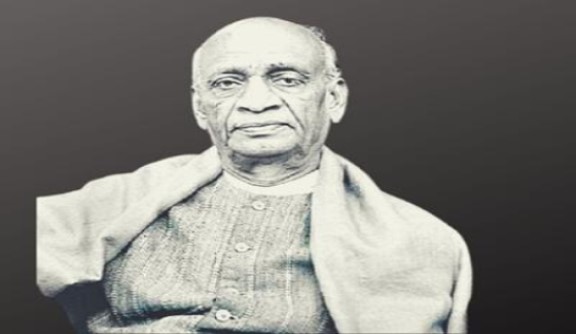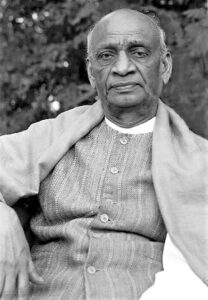
Vallabhbhai Patel also known as Sardar Vallabhbhai Patel (Born on 31 October 1875 – Died on 15 December 1950) was an Indian politician, India’s first deputy prime minister, and freedom fighter of India. For his all great works, he is popularly known as Iron Man of India.
He was an Indian lawyer and statesman, a senior leader of the Indian National Congress, and one of the founders of the Republic of India, who played a leading role in the country’s struggle for independence and guided its integration into a united and independent nation.
In India and elsewhere, he was often called Sardar, “chief” in Hindi, Urdu, and Persian. He served as Supreme Commander of the Indian Army during the political integration of India and the 1947 Indo-Pakistani War.
He is also called the “Unifier of India”. On 31 October 2018 Prime Minister Narendra Modi, was inaugurated the Statue of Unity, the world’s tallest statue, was dedicated to Sardar Patel which is approximately 182 meters (597 ft) in height.

Vallabhbhai Patel Facts
- Born: 31 October 1875, Nadiad, Bombay Presidency, British India
(present-day Gujarat, India) - Birth Name: Vallabhbhai Jhaverbhai Patel
- Nickname: Sardar Patel, Iron Man Of India
- Nationality: Indian
- Religion: Hinduism
- Political party: Indian National Congress
- Spouse: Jhaverba Patel (m. 1893–1909)
- Children: Maniben Patel, Dahyabhai Patel
- Father: Jhaverbhai Patel
- Mother: Ladba Patel
- Died: 15 December 1950, Bombay, Bombay State, India
(present-day Mumbai, Maharashtra) - Cause of death: Heart attack
- Cremate: Sonapur Cemetery
- Awards: Bharat Ratna (1991) (posthumously)
- Quotes: “My only desire is that India should be a god producer and no one should be hungry, shedding tears for food in the country.”
Vallabhbhai Patel Biography
Vallabhbhai Patel was born on 31 October 1875, as a Vallabhbhai Jhaverbhai Patel in Nadiad, Bombay Presidency, British India (present-day Gujarat, India). Patel came from a family of small rural landowners from the Patidar caste, near Surat, Gujarat. He was the fourth child of Jhaverbhai Patel and Ladba Devi.
His father would have participated in the Sepoy revolt under the orders of the rani Lakshmî Bai. Sardar Vallabhbhai Patel started his education in a Gujarati medium school and later shifted to an English medium school.
He passed high school in 1896 and started preparing for law exams. He passed matriculation at an older age (22 years). He went to England in 1910 to study law. After studying as a lawyer at the Middle Temple in England (1910 – 1913), where he graduated in two years instead of the usual three, he immediately returned to India and opened a practice in Ahmadabad.
Vallabhbhai Patel soon meets Gandhi and joins the movement for civil disobedience. He became the chairman of the Congress Party in 1931 and, thanks to his efforts, the party won 100% of the votes in the 1937 election.
He was imprisoned many times by the British for his political activities, in particular August 9, 1942, at the end of the world conflict, following the “Quit India” resolution which called on the colonial power to withdraw from the country.
After Independence
Although Sardar Vallabhbhai Patel had the majority support of the Congress party members, respecting Gandhiji’s wish, Patel kept himself away from the race for the post of Prime Minister and supported Nehru for this.
He was assigned the work of the Deputy Prime Minister and Home Minister. But even then, the relationship between Nehru and Patel remained tense. Due to this, both of them had threatened to renounce their posts on several occasions.
His first priority as Home Minister was to unite the indigenous princely states (states) in India. He edited it without shedding any blood. Only in Hyderabad State did he send an army to Operation Polo.
Sardar Vallabhbhai Patel is known as the Iron Man of India for his great contribution to the integration of India. He died in 1950. After this, there was very little opposition from Nehru within the Congress.
Role in Unification of India
Patel became the first Home Minister and Deputy Prime Minister after India gained independence. Patel played a vital role in bringing about 522 states under Indian rule in post-independence India.
The British government gave these rulers two options – they could join India or Pakistan, Or they may be independent. This section exacerbates the difficulty. The Congress entrusted this daunting task to Sardar Patel, who in 1948 began overseeing the consolidation of the states.
He succeeded in uniting all the states except Jammu and Kashmir, Junagadh, and Hyderabad. Eventually, he dealt with the situation with his sharp political wit and brought Jammu and Kashmir, Junagadh and Hyderabad under Indian rule.
The India we see today is the result of the efforts made by Sardar Vallabhbhai Patel. Sardar Patel was a top member of the Constituent Assembly of India and Dr. B.R. Ambedkar was appointed on his advice. He was a key force in establishing the Indian Administrative Service and the Indian Police Service.
He took a personal interest in initiating efforts to restore the Somnath temple in Saurashtra, Gujarat. Patel responded strongly to Pakistan’s efforts to invade Kashmir in September 1947.
He immediately expanded the army and improved other infrastructural aspects. He did not agree with Nehru on the treatment of Pakistan on the refugee issue. He set up multiple refugee camps in Punjab, Delhi, and later in West Bengal.
Vallabhbhai Patel Death
On March 6, the authorities lost contact with the plane in which the Sardar and his daughter Maniben Patel and the Maharaja of Patiala were traveling. The pilot had to make an emergency landing in the desert region of Rajasthan due to engine failure.
No one was harmed on the occasion and the Sardar Patel walked with other pilgrims to a nearby village and informed the local authorities.
When the Sardar arrived in Delhi, he was given a hearty welcome by thousands of Congress workers as well as ministers in Parliament who stood up and greeted him with a long round of applause which led to the adjournment of Parliament for half an hour.
In the later years of his life, Sardar was honored by Parliament as well as an honorary doctorate from the University of the Punjab and Osmania University. Sardar’s health deteriorated during the summer of 1950.
He later started coughing up blood and Maniben Patel then reduced his talks as well as working hours and arranged for personal medical help and attendants to look after the Sardar. On December 15, 1950, he suffered a massive heart attack (his second) which led to his death.
In an unprecedented and unique event that day, 1,200 officers of the Indian Civil Service and Police Service met at the Sardar’s residence in Delhi to mourn his demise and pledged to serve India with “complete loyalty and unwavering zeal”.
The Sardar Patel was cremated at the Sonapur Cemetery in Mumbai, attended by a large crowd, including Nehru, Rajagopalachari, and President Rajendra Prasad.
Vallabhbhai Patel Quotes
- Every citizen of India must remember that he is an Indian and he has every right in this country but with certain duties.
- There is something unique in this soil, which despite many obstacles has always remained the abode of great souls.
- Even if we lose the wealth of thousands, and our life is sacrificed, we should keep smiling and be cheerful keeping our faith in God and Truth.
- Non-violence has to be observed in thought, word, and deed. The measure of our non-violence will be the measure of our success.
- Manpower without unity is not a strength unless it is harmonized and united properly, then it becomes a spiritual power.
- The negligence of a few could easily send a ship to the bottom, but if it has the wholehearted co-operation of all on board it can be safely brought to the part.
- Little pools of water tend to become stagnant and useless, but if they are joined together to form a big lake the atmosphere is cooled and there is universal benefit.
Sources
- Vallabhbhai Patel Wikipedia.org
- The great unifier of India (The Indian Express)
- “Gazette of India – Extraordinary – Minister of Home Affairs (Resolution)”